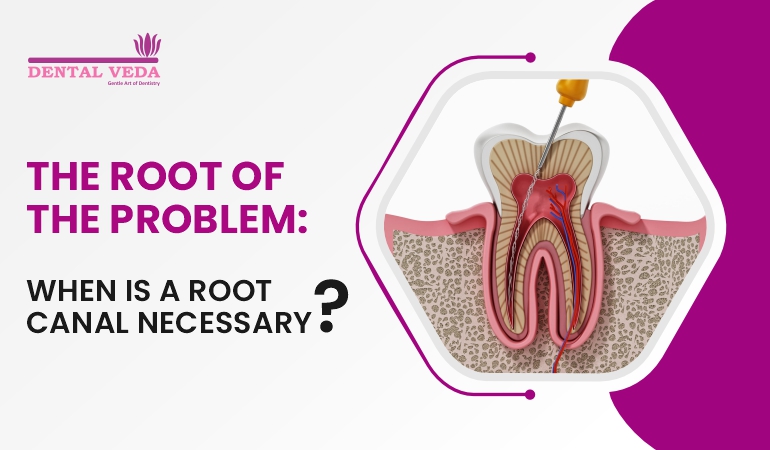Root canal treatment is a part of endodontics that saves your teeth by treating their roots exposed to bacteria and infection.
Most people are scared of getting a root canal because they’ve heard from friends or grandparents that it’s painful and scary. Contrary to the rumors and heresy, the root canal is a safe and highly effective procedure that saves teeth from further deformities.
So, whether your dentist has advised you to undergo a root canal treatment or you have some unanswered questions that intimidate you, don’t worry!!
We are here to give you all the necessary information regarding the root canal treatment that you might be looking for.
So, let’s start.
What is a Root Canal Treatment?
The root canal is a dental procedure used to address problems with the innermost part of a tooth, called the pulp. When the pulp becomes damaged or infected, a root canal can be a necessary treatment to save the tooth and prevent further damage or complications.
During a root canal, a dentist or endodontist (a specialist in treating the pulp and root of teeth) removes the damaged or infected pulp from the tooth, cleans and shapes the inside of the tooth, and fills the space with a special material to prevent future infection. This process can help to alleviate pain and swelling, prevent the spread of infection, and preserve the natural tooth structure.
When is Root Canal Necessary?
The only way to ensure you need a root canal is by visiting your dentist. But still, here are some warning signs you must look out for.
Persistent Pain
Persistent tooth pain for a longer duration might indicate that you need a root canal treatment. The pain may be harsh and bother you constantly, or it might go away for some time and return.
Dental conditions leading to pain may include:
- Gum Disease
- Sinus Infection
- Damaged Filling
- An impacted or infected tooth
- Cavities
So, no matter what the cause is, it is always better to see a dentist. If there is something serious, it can be diagnosed early and treated effectively.
Sensitivity To Heat and Cold
Do you feel pain while eating a hot meal or drinking hot coffee? Or perhaps you feel sensitivity while drinking ice-cold water or eating ice cream. These symptoms may indicate either your blood vessels or teeth are infected or damaged.
You might feel some dull aches or sudden sharp pain. In such a case seeing a dentist is a must to know about your dental issues and get relief from the pain.
Tooth Discoloration
An infection in the pulp or an inadequate blood supply to your teeth can cause discoloration of your teeth. Indicating the possible need for root canal treatment to bring your teeth back to their usual color.
Trauma to the tooth or breakdown of internal tissues can damage your roots, giving your teeth a grayish-black appearance. Although tooth discoloration does not always mean you need a root canal, it’s always good to seek a dentist’s advice.
Swollen Gums
Swollen gums near the painful tooth may indicate that you need a root canal. The swelling might come and go after every few hours or so. Moreover, the swelling may be tender when you touch it.
The swelling is caused due to the acidic waste product of the dead pulp tissue, causing swelling on the tip of the root area. Apart from swollen gums, you might experience small pimples on your gum, also known as gum boils, parulis, or abscesses.
The pimple might ooze pus due to the infection in the tooth, giving your mouth an unpleasant taste and bad breath.
Pain While You Eat or Touch Your Tooth
Due to the dead pulp, the tissues around the root tip of an infected tooth become hypersensitive and cause pain while you eat or touch your teeth. This whole situation indicates tooth decay and nerve damage, which can be treated with the help of root canal treatment.
Additionally, if the sensitivity persists for a longer duration even after you have stopped eating, make sure you see a dentist on priority. They can guide you in having a pain-free bite.
Chipped or cracked tooth
If you have a chipped or cracked tooth due to a contact sport, an accident, or chewing on something hard, the bacteria can set in, causing inflammation and infection. Even an injured tooth can damage the nerves, and these damaged nerves become inflamed and can cause sensitivity and pain in the long run.
For such a situation, you need a root canal treatment to help you have healthier teeth.
What happens during a root canal procedure?
The root canal procedure is carried out by a dentist or endodontist (a specialist in root canal treatment) and involves the following steps:
- Local Anesthesia:
- Access the Tooth:
- Removing the Pulp:
- Clean and Shape the Canals:
- Filling the Canals:
- Placing a Temporary Filling:
- Placing a Permanent Filling or Crown:
The first step in a root canal procedure is to numb the area around the tooth with local anesthesia. This helps to reduce any pain or discomfort during the procedure.
After the anesthesia takes effect, the dentist will use a drill to create a small hole in the top of the tooth, which allows access to the pulp chamber.
The next step is to remove the infected or damaged pulp (the soft tissue inside the tooth). This is done using specialized instruments, which help clean the canals. The process is carried out until all infected or damaged tissues are removed.
Once the pulp has been removed, the dentist will clean and shape the canals inside the tooth. It is done to ensure the removal of the infected material. Finally, the canals are prepared for the filling materials.
After the canals have been cleaned and shaped, the dentist will fill them with a rubber-like material called gutta-percha. This material helps to seal the canals and prevent further infection.
Once the canals have been filled, the dentist will set a temporary filling on the top of the tooth to protect it until the final restoration.
In most cases, a tooth with a root canal procedure will require a crown or other restoration to protect it from further damage. The dentist will discuss the best options for restoring the tooth with the patient.
Depending on the case’s complexity, a root canal procedure typically takes one or two appointments.
Is Root Canal Painful?
The idea of getting a root canal can be scary for many people, but modern techniques and advancements in dentistry have made the procedure quite comfortable than it used to be. In most cases, a root canal treatment is no more painful than getting a filling.
After the procedure, patients may experience some sensitivity or discomfort, but this can usually be managed with some medication. In most cases, any discomfort will subside within a few days to a week.
While a root canal treatment may sound intimidating, it is a safe and effective way to save the infected or damaged tooth and prevent it from extraction. In addition, dentists are highly trained to provide comfortable and effective treatments, so patients should feel confident in seeking care for their dental needs.
To ensure proper healing and prevent infection, following the dentist’s postoperative instructions is essential. Patients should also practice good oral hygiene habits, including brushing & flossing regularly and visiting the dentist for regular check-ups and cleanings.
Conclusion
Although the term’ root canal’ may cause anxiety among some people, there’s nothing in this treatment that you should be scared of. Painless root canal treatment in Sushant Lok is possible with us. In most cases, people will feel much better shortly after their treatment.
If you are still scared of the treatment, contact us for laser root canal treatment in Sushant Lok Gurgaon.
Look no further than Dental Veda for the best dentist in Sushant Lok!
Frequently Asked Questions
What happens after a root canal?
After a root canal, the tooth may be sensitive and tender for a few days, and a temporary filling or crown may be placed to protect the tooth. Once the tooth has fully healed, a permanent filling or crown will be placed to restore the tooth's function and appearance. It is important to maintain good oral hygiene and visit the dentist regularly to ensure the long-term success of the root canal.
How long does a root canal take?
The duration of a root canal procedure depends on the complexity of the case and the number of canals in the tooth. Most root canals can be completed in one or two appointments, each lasting about 1-2 hours.
What is the success rate of a root canal?
The success rate of a root canal is generally high, generally lasting a lifetime with proper care. However, the procedure's success depends on factors such as the severity of the infection, the quality of the dental work, and the patient's oral hygiene habits.


